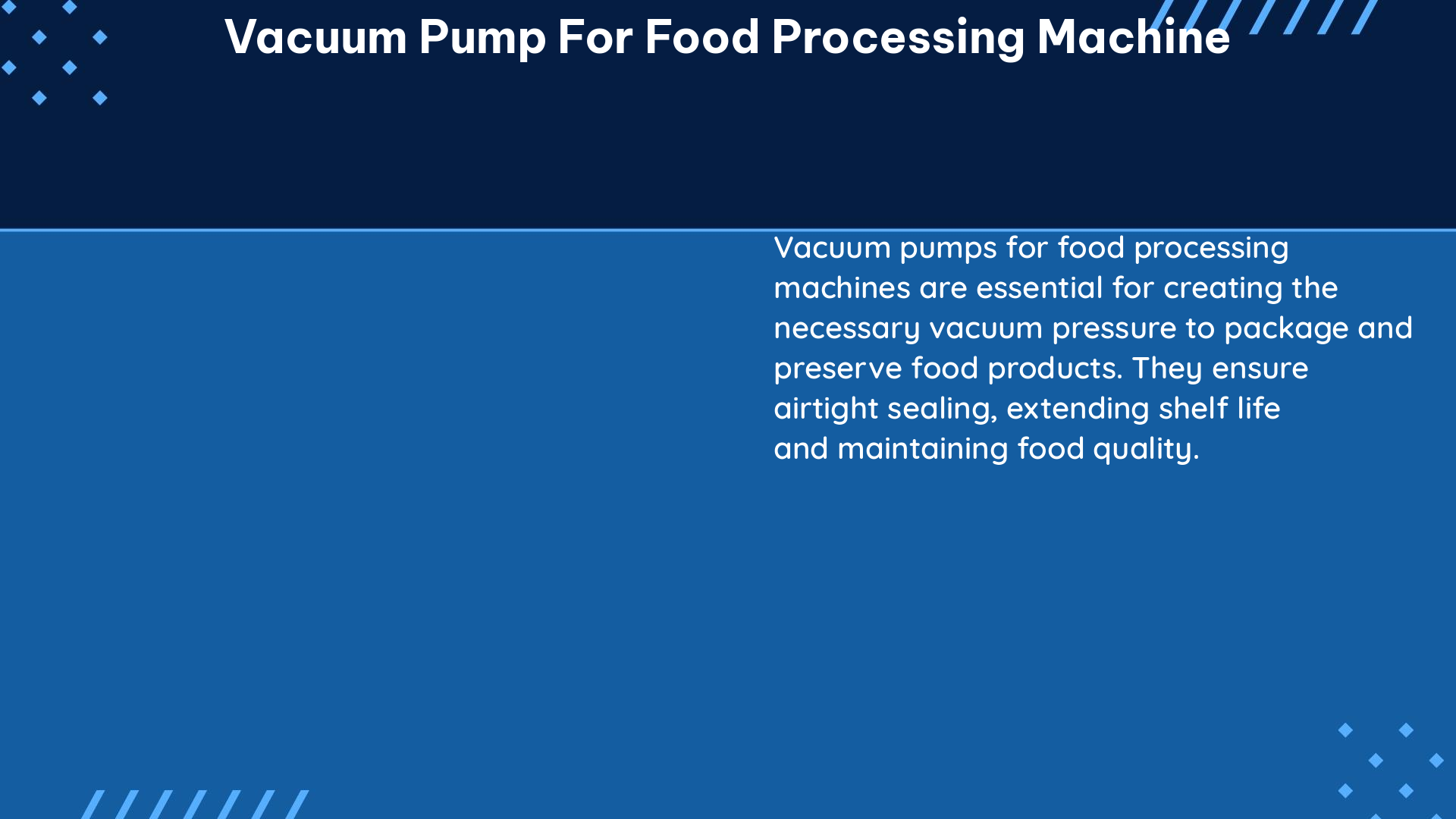Vacuum pumps are essential equipment in the food processing industry, playing a crucial role in various applications such as food packaging, evisceration, sugar crystallization, and corn evaporation. These versatile machines contribute to preserving food, reducing waste, and improving the efficiency of processing systems.
Understanding the Importance of Vacuum Pumps in Food Processing
Vacuum pumps are instrumental in creating air-tight seals for food packaging, which can significantly reduce the growth of bacteria and mold. By leveraging optimal cooling, these pumps can also help keep fruits and vegetables fresh and healthy directly after harvest. Additionally, vacuum drying can quickly preserve meat and vegetables by sustaining a maximum pressure that evaporates water while preserving the food, creating a firm seal.
In the case of chicken and fish evisceration, vacuum pumps are essential in removing the entrails from packaged meats. This process can lead to higher food quality, greater sanitation, and increased operational productivity.
Vacuum Pumps in Sugar Production and Corn Evaporation

In sugar production, vacuum pumps are used to transform sugar cane into refined products for the market. They are employed to filter the bagasse, or the remaining juice from the mixture, and assist in the evaporation and crystallization of sugar in facilities.
For corn evaporation, a specialty vacuum pump can be used to aid in the drying process of corn. This is crucial as corn cannot contain excess water before packaging for sanitation and preservation reasons.
Technical Specifications of Vacuum Pumps for Food Processing
When selecting vacuum pumps for food processing applications, it is essential to consider the following technical specifications:
Material
Stainless steel pumps are designed to maintain long-term operation in complex food manufacturing systems. These pumps are corrosion-resistant and can withstand the harsh environments often found in food processing facilities.
Pressure
Vacuum pumps used in the food industry must be capable of sustaining a maximum pressure where the food items are preserved, and the water is evaporated, creating a firm seal. This pressure range can vary depending on the specific application, but it is typically in the range of 10-100 mbar (0.01-0.1 atm).
Efficiency
Dry pumps, which are replacing wet pumps in the food industry, offer several benefits:
– Reduced costs due to lower heat load and power consumption
– No use of oil and water, reducing maintenance and repair requirements
– Peak efficiency with low heat generation and reduced noise levels
– Improved sanitation as they can be cleaned manually with selected cleaning products
Ensuring Reliable Oil Analysis for Vacuum Pumps
To maintain the optimal performance and longevity of vacuum pumps in food processing, regular oil analysis is crucial. Drawing a representative oil sample involves a combination of factors, including:
-
Selecting the Right Location: Identify the appropriate sampling points within the vacuum pump system to ensure the collected sample accurately represents the condition of the entire system.
-
Deploying the Right Method: Utilize the appropriate sampling method, such as a vacuum pump oil sampling kit, to extract the oil sample without introducing contaminants.
-
Using the Right Hardware: Employ the correct sampling hardware, including clean containers and labeling materials, to preserve the integrity of the oil sample.
-
Determining the Right Sampling Frequency: Establish a regular sampling schedule based on the pump’s operating conditions, manufacturer recommendations, and industry best practices.
-
Providing Relevant and Accurate Labeling: Ensure the oil sample is properly labeled with relevant information, such as the pump’s identification, operating hours, and any notable observations.
By following these best practices, you can ensure the data derived from oil analysis is reliable and actionable, allowing you to make informed decisions about the maintenance and performance of your vacuum pumps.
Conclusion
Vacuum pumps play a crucial role in the food processing industry, contributing to food preservation, reduced food waste, and improved processing efficiency. When selecting a vacuum pump for food processing applications, it is essential to consider factors such as material, pressure, and efficiency to ensure optimal performance and food safety.
By understanding the technical specifications and best practices for vacuum pump maintenance, food processing professionals can leverage these versatile machines to enhance their operations, improve product quality, and drive sustainable growth in the industry.
References:
– Vacuum Pump to Preserve Food
– Understanding the Right Vacuum Pump for Your Food Application
– Vacuum Pump Oil Sampling
– How Vacuum Pumps Contribute to the Food Industry
– Vacuum Pump Remote Connectivity and Monitoring

The lambdageeks.com Core SME Team is a group of experienced subject matter experts from diverse scientific and technical fields including Physics, Chemistry, Technology,Electronics & Electrical Engineering, Automotive, Mechanical Engineering. Our team collaborates to create high-quality, well-researched articles on a wide range of science and technology topics for the lambdageeks.com website.
All Our Senior SME are having more than 7 Years of experience in the respective fields . They are either Working Industry Professionals or assocaited With different Universities. Refer Our Authors Page to get to know About our Core SMEs.